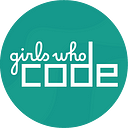In Her Words: When I was in high school, I didn’t know what coding was. Today, it’s my life.
By: Tsipora Stone, Girls Who Code alumni
These days, it feels like everyone is talking about the future of work and, increasingly, the conversation has become heavily centered on the growing popularity of STEM and computer science classes in K-12 education. As a current technology intern with AT&T and soon-to-be senior in college, I am excited about the drive to expand STEM learning to more young people across the country. But, I struggle with how slowly STEM programming is introduced at many schools and worry about the students who may feel lost as a result.
Although it may be hard to believe, just four years ago, my high school didn’t offer any computer science related classes. I honestly didn’t even really know what coding and computer science were, and as a result, couldn’t see the ways in which women were beginning to assume more prominent roles in these fields.
Unfortunately, in my home state of New Jersey, my limited computer science knowledge is statistically unsurprising. While more than half the state’s population is comprised of women and minorities, these populations are much less likely to pursue STEM academically or professionally. Across the state — and especially in schools serving high numbers of minority students — schools often lack the resources and fail to dedicate the time to educating students on science. Yet, according to research, nine in 10 parents align with the view, “offering opportunities to learn computer science is a good use of resources at their child’s school.”
It was my mom who first showed me the Girls Who Code website and encouraged me to apply. In high school, I was interested in math, but couldn’t envision what a future career in the field would look like.
Girls Who Code changed my life.
Over the course of seven weeks, I learned building blocks of technology — Python, JavaScript and robotics. As my formal tech training and skills progressed, I became more confident in myself and my capabilities. I was no longer intimidated by my peers who had years of experience under their belts before I’d even typed out my first line of code. I began to imagine myself thriving in a tech-forward career.
Throughout the summer, we heard from female mentors from a variety of companies, which I loved. It gave us the chance to see how many amazing women were succeeding in their STEM careers — female representation I had never seen throughout my high school experience — and helped us envision that we, too, could be in those positions someday.
When I applied to the University of Maryland, I didn’t think twice about declaring my computer science major. Girls Who Code had helped me realize my passion and I wanted to stay involved in the program.
Our cohort continued to meet up during the summer, cheering each other on as we ventured forward academically, socially and professionally. Using the Girls Who Code portal, I was able to connect with businesses that support the program. This is how I secured an internship with AT&T, where I’ve had the chance to work closely with their technology and innovation team, cultivating an even deeper understanding of the skills that I know are vital to my future success.
As I wrap up my internship and begin my last year of college, I am in awe of how far I’ve come in just a few years. From having no knowledge of coding, to working alongside my teammates at AT&T today, it is hard to believe that the girl from New Jersey who had never taken a computer science class is where she is today.
As education continues to evolve to meet the changing needs of today’s workforce, it can be easy to think that certain opportunities that might be available to one student are inaccessible to another. But, across the country, businesses, non-profits, educators, workers, and students are coming together to find solutions — such as supporting programs like Girls Who Code — to ensure that students everywhere have access to the opportunities that will play a vital role in preparing them for the future.
Tsipora Stone is an alum of the Girls Who Code‘s Summer Immersion Program in 2014 hosted by AppNexus. She is currently a software engineer at AT&T and studying Computer Science at the University of Maryland.
Sources: Gallup Study and ESC
